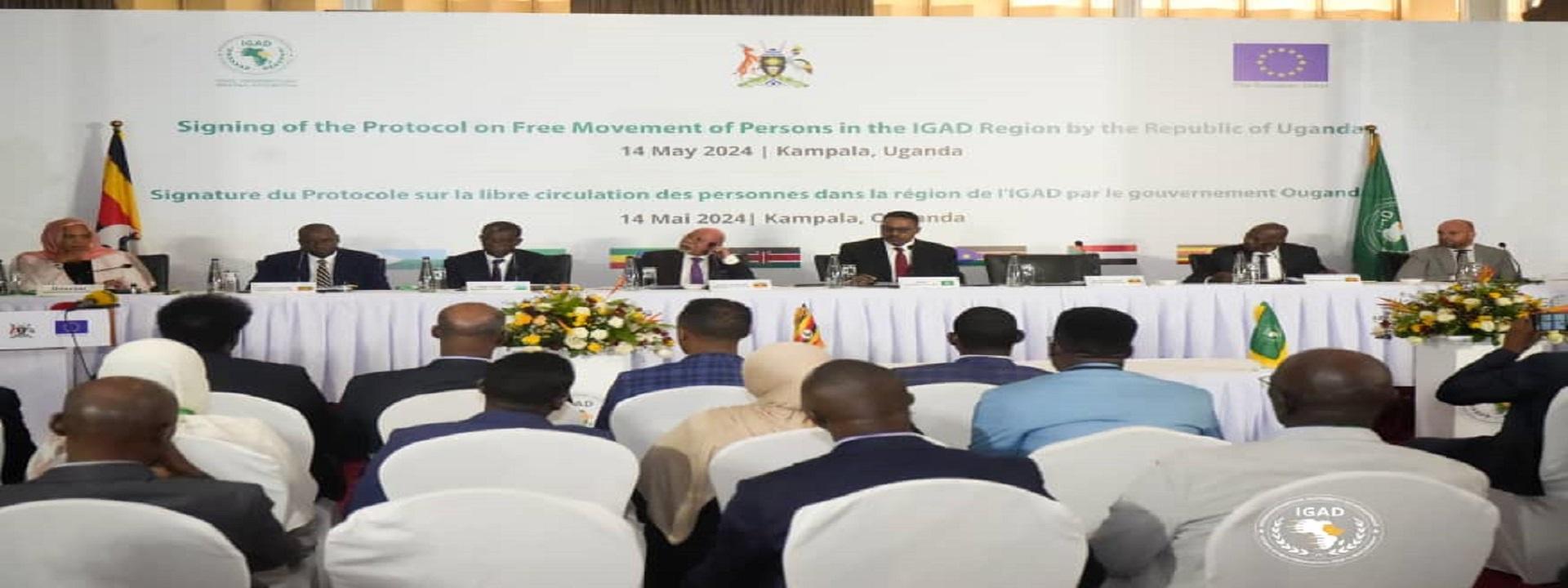May 14, 2024 (KAMPALA, Uganda): A pivotal moment was witnessed today in Uganda as the Republic of Uganda signed the Intergovernmental Authority on Development (IGAD) Protocol on Free Movement of Persons in IGAD Region.
The event saw the signing by Hon. Gen. Abubaker Jeje Odongo; Minister of Foreign Affairs of the Government of Uganda, as the Protocol signatory.
And was witnessed by Colonel Idriss Djama Guirreh; representing the IGAD Chair, Republic of Djibouti, H.E. Dr. Workneh Gebeyehu; the Executive Secretary of IGAD, Hon. Balam Barugahare; Minister o State for Gender, Labour and Social Development in charge of Youth and Children; Hon. Jackson Kafuzi; Deputy Attorney General and Minister of State for Justice and Constitutional Affairs, H.E. Gullaume Chartrain; Deputy Head of EU Delegation to Uganda, Mme. Fathia Alwan; Director of the IGAD Health and Social Development Division, as well as high-level representation from the IGAD Secretariat and IGAD Member States.
The event was also witnessed by representatives from partners, namely the ILO, IOM, and Platform for Disaster Displacement (PDD) Geneva, Switzerland.
Today, five IGAD countries have signed the Protocol, namely the Republic of Sudan, the Republic of South Sudan, the Federal Republic of Somalia, and the Federal Democratic Republic of Ethiopia, and the Republic of Uganda.
Member States have continued to take steps to manage and address migration and mobility challenges in the region. Since 2017, IGAD MS has embarked on the process towards the establishment of a free movement regime through robust country consultations, development, and negotiations of the Protocol on Free Movement of Persons and Transhumance. In due course, the Protocols were
endorsed on February 26, 2020, by the IGAD Committee of Ambassadors. Furthermore, the Protocol on Free Movement of Persons was approved by the IGAD Member State Ministers in charge of Internal Affairs and Labour in 2020. Earlier in 2013, the Summit of the IGAD Heads of State and Government adopted a Minimum Integration Plan to serve as a road map for regional integration, in which the free movement of people is a key pillar.
IGAD and its Member States have also developed and adopted a comprehensive migration policy framework, the IGAD Regional Migration Policy Framework in 2012 and further developed the Migration Action Plan (MAP) for 2015–2020, identifying facilitation of labour mobility, transhumance, and free movement of persons, including the possibility of establishment and residence, as their strategic priorities. Member States have since 2020 entered into substantive discussions and consultations on a draft Free Movement Protocol within member countries.
IGAD Member States have continuously made commitments and made great strides towards achieving greater regional integration among Member States in order to realise trade regional expansion, economies of scale, and greater foreign direct investment, all of which contribute to accelerated economic growth and increased welfare and security of countries to benefit the IGAD citizenry.
The signing event will be followed by a review of the IGAD-EUTF-ILO end of Phase 1 Project (2017-2023) “Towards Free Movement of Persons in the IGAD Region,” which was implemented by the IGAD Secretariat with significant strides and achieved concrete milestones towards the realization of a free movement regime, advancing opportunities for regular labour migration and transhumance, and capacity development of the IGAD Secretariat and Member States. The project was funded by the European Union and was in collaboration with the ILO’s “Free Movement of Persons and Transhumance in the IGAD Region: Improving Opportunities for Regular Labour Mobility” within the EUTF framework to facilitate free movement of persons and improve regular labour migration and mobility in the IGAD region to enhance regional economic integration and development.
Phase II of the IGAD-EU-ILO NDICI Project (2024–2027) is geared towards the implementation of the regimes of free movement of persons, labour mobility, and managing disaster displacement and transhumance in the IGAD Region. Member States will work on their legal, policy, and institutional frameworks and procedures to allow the IGAD Protocol to be operationalized in the region.
Notes to the Editor
- The Protocol on Free Movement of Persons is enshrined in the 1996 Agreement Establishing the Intergovernmental Authority on Development (IGAD), Art. 7(a) and Art. 13(o), where the Agreement establishing IGAD calls upon IGAD Member States (MS) to deepen regional integration through, among other things, creating a regime of free movement of persons, right of residence, and right of establishment.
- The aspiration of an IGAD free movement regime is in line with the aspirations of the African Union’s (AU) Agenda 2063, which advocates for free movement within regional economic communities (RECs).
- The AU has further championed this by adopting the 2018 Treaty Establishing the African Economic Community relating to Free Movement of Persons, Rights of Residence, and Right of Establishment and the Africa Continental Free Trade Area (AfCFTA) to create a single continental market for goods and services. The IGAD Protocol is therefore a regionalization of the AU Protocol on Free Movement of Persons in Africa (2018).
For more information, contact:
- Austine Opata, Ag. Head of Communication Unit, austine.opata@igad.int
- Sharon Kuku, Media Mobilizer, +256-772-507242
For more information and updates:
https://linktr.ee/IGADsecretariat

